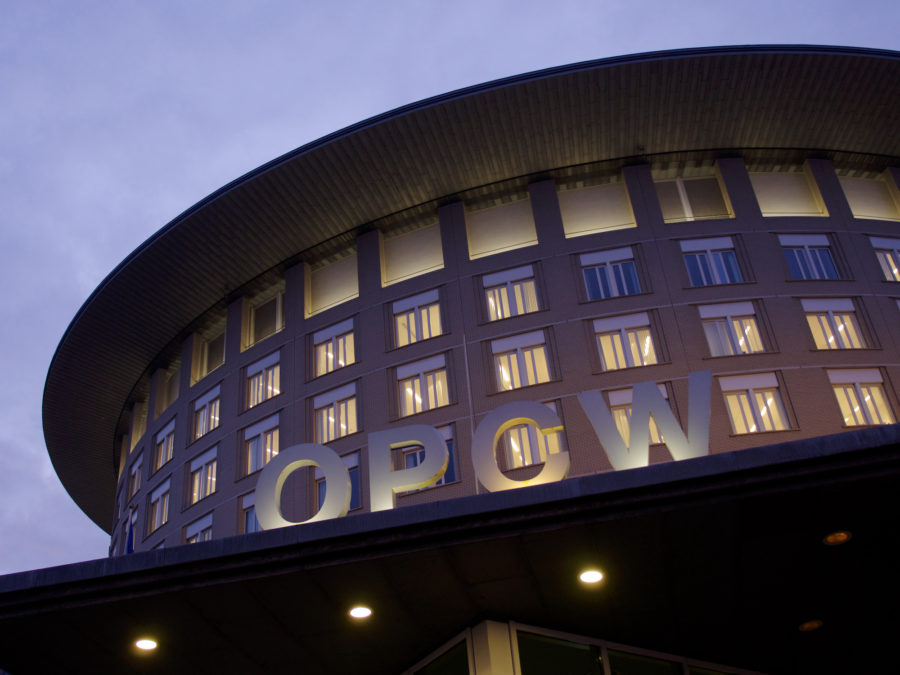Dr Renata H Dalaqua is a Political Scientist and Head of the Gender and Disarmament Programme at the United Nations Institute for Disarmament Research (UNIDIR). Previously, she was the Deputy Director of Projects at the Brazilian Center for International Relations (CEBRI) and a Consultant with VERTIC’s National Implementation Measures programme.
Since its entry into force, in 1997, the Chemical Weapons Convention (CWC) has become a pillar of the international disarmament architecture. Its 25 years of existence have seen numerous successes, and its original goal – the elimination of all declared stockpiles – is close to being achieved. Through capacity-building and technical cooperation programmes delivered by the Organisation for the Prohibition of Chemical Weapons (OPCW), the CWC has also contributed to the advancement of peaceful applications of chemistry. As we take stock of the past and look ahead to future opportunities to strengthen CWC implementation, gender mainstreaming emerges as an important area for action, one that can bring benefits to both disarmament and the peaceful uses of chemistry.
We know from different studies that diverse teams tend to be more innovative and effective in anticipating problems and finding sustainable solutions, as they trigger more careful information processing than within homogenous groups. In the field of chemical disarmament, gender diversity has been identified as a factor in the innovative approach of destroying Syrian chemical weapons at sea rather than on land. According to interviews with arms control and disarmament experts based in the US, this idea was initially dismissed in Washington, D.C. as “too outside-the-box”, until it was taken up and championed by a small group of well-placed women. Interviewees noted that although the original idea had come from a man, it was the tenacity of one women leader who championed the idea and the willingness of other women colleagues to support her that made this outcome possible. At the multilateral level, efforts to eliminate the Syrian chemical weapons also benefited from the leadership of women such as Sigrid Kraag, who successfully led the OPCW-UN joint mission, and both Izumi Nakamitsu and Angela Kane, respectively the current and previous UN High Representative for Disarmament Affairs.
Stories like this one are somewhat rare in the field of disarmament, which has long been marked by gender disparities. In the early 1990s, when the CWC was negotiated, the average proportion of women amongst delegates accredited to disarmament meetings was less than 15%. Although the proportion has improved, we are still a long way from gender parity. Today, women tend to make up only a third of the diplomats at CWC conferences, and the challenge is even greater at the leadership level. At the 2021 Conference of States Parties to the CWC, 70% of heads of delegations of States Parties were men and just 30% were women.
So what can be done to improve women’s participation and gender diversity in the chemical weapons regime? At a national level, countries interested in promoting gender equality in their delegations could set objectives and directives to improve women’s participation — for example, by providing more speaking roles in negotiations or giving priority to women in one-person delegations. Additionally, foreign services could adopt policies to help eliminate harassment; introduce mandatory unconscious-bias training for all staff; and support a change of perceptions and behaviours. At a multilateral level, the OPCW Technical Secretariat could collect, track and publish gender-disaggregated data and statistics on gender balance in delegations.
It should be noted that the OPCW already implements activities to improve women’s participation in chemistry, such as an annual symposium highlighting the contributions women have made to the peaceful uses of chemistry. In the past couple of years, OPCW’s Technical Secretariat also established a gender parity strategy and a network of Gender Focal Points to provide support, counsel, and training initiatives to encourage work/life balance and gender mainstreaming across the Organisation. Although the OPCW has achieved gender parity at the leadership level, a gender gap persists in professional or higher categories, where women are still underrepresented.
Building on ongoing initiatives, CWC stakeholders could enhance gender mainstreaming efforts by engaging with gender analysis. A gender analysis examines the relationships between genders and their access to and control of resources, as well as the constraints they face relative to each other. When applied to chemical weapons policy and research, a gender analysis can identify structural barriers that may constraint participation in CWC-related discussions and projects, including inequalities in areas like access to education in chemistry, opportunities to influence policymaking and benefits from the peaceful uses of chemistry.
Gender analysis can also help to uncover how different groups of society are affected by chemical agents. In previous chemical incidents, for example, gender roles have shaped distinct experiences of social stigma for individuals exposed to toxic agents. Following the Bhopal disaster, for example, young women who had been exposed to toxic gases were particularly vulnerable to discrimination and social ostracism. Biological sex differences have also been observed in relation to health effects, as research has indicated possible variation in levels of susceptibility to toxic agents between sexes. For instance, males can be more susceptible to organophosphates pesticides – the chemical family to which the highly toxic nerve agents belong – than females.
These examples underscore the importance of incorporating sex and gender analysis into research and policy, which could unlock new areas for action under the CWC, especially under Article X on “Assistance and Protection Against Chemical Weapons”. Here, gender-responsive strategies would enable effective communication with all groups of society, minimise stigma, ensure better medical care and empower survivors.
Be it in The Hague or on the ground, gender mainstreaming offers an opportunity to craft a new future for disarmament – one that takes into account everyone’s needs in order to deliver the best results.
Note: British Embassy The Hague offers its blog platform for guest posts. The views expressed in the guest posts are those of the authors. The British Embassy The Hague is not responsible for content on external sites.

